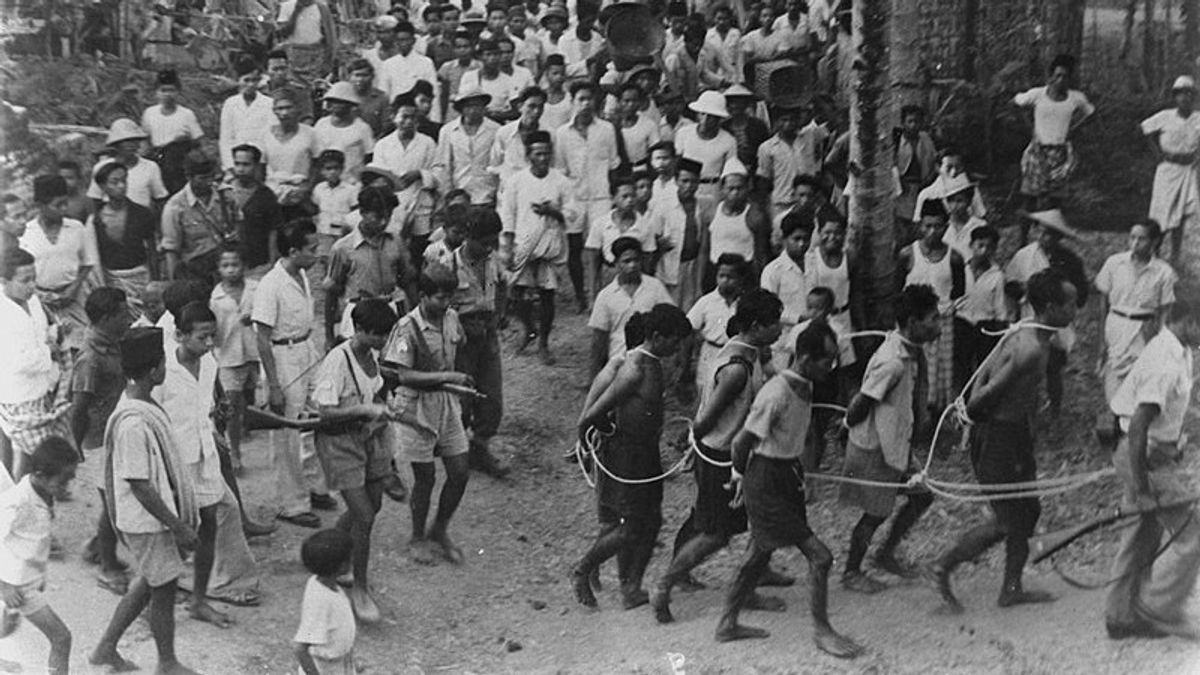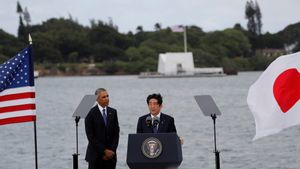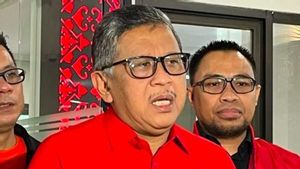JAKARTA - The fall of Amir Syarifuddin's cabinet after the Renville Agreement caused socialist groups to be displaced from the government. Hatta took over his role in the government. The disputes at the elite level penetrated to the grass roots, giving birth to an event that will be remembered in history: the PKI rebellion in Madiun.
The Dutch still did not recognize Indonesia's 100 percent independence at that time. They continue to lobby Indonesia so that it does not completely escape from their laps. One such effort is seen in the Renville Agreement.
The agreement made it difficult for Indonesia. The negotiations made Indonesia's territory even narrower and the economic blockade from the Dutch made Indonesia even more complicated.
As a result, many community groups protested the outcome of the negotiations, which led to the emergence of anti-government groups. This shook the stability of Amir's cabinet until it ran aground.
After Amir's cabinet disbanded, President Sukarno appointed M. Hatta as prime minister. The Hatta Cabinet was born.
The role of the socialists in the cabinet was weakened under the Hatta cabinet. Amir was apparently not satisfied with that. So he formed an opposition axis by establishing the People's Democratic Front (FDR) on June 28, 1948.
The FDR is an opposition group consisting of the left, including the communists. They consist of the Indonesian Socialist Party, the Indonesian Socialist Youth, the Indonesian Labor Party, the Indonesian Plantation Workers Sarekat, and of course the Indonesian Communist Party (PKI).
The opposition axis felt that the new regulation under the Hatta Cabinet was detrimental to it. The rules known as reorganization and rationalization were considered detrimental because they reduced their military power in the TNI-Masyarakat and Panembahan Senopati Division.
Musso Revolution
When the fighting was hot, Musso from Moscow came to Indonesia. Musso offers a political concept of the 'New Way'. In Musso's 'New Way' politics, the working class party became one. As a result, the Indonesian Labor Party and the Socialist Party came under one PKI umbrella. This fusion was planned to lead a revolution to establish a national front government.
Musso increasingly opened Jalan Baru by holding a big meeting in Yogyakarta. According to Hendri F. Isnaeni in his writing in Historia , at the big meeting Musso conveyed the importance of changing a presidential cabinet to a united front cabinet.
He also called for international cooperation, especially with the Soviet Union to break the Dutch blockade. Together with a number of PKI leaders, Musso traveled to areas in Java, namely Solo, Madiun, Kediri, Jombang, Bojonegoro, Cepu, Purwodadi, and Wonosobo. In the middle of this safari, the Madiun incident took place.
Not standing still, the Government of Ri sent an ultimatum by sending Colonel Gatot Subroto to Surakarta. Gatot Subroto consults the parties involved to stop by September 20. Those who disobeyed were considered rebels.
Rebellion
Instead of heeding the ultimatum, FDR is actually getting more and more guerrilla. On this day, 18 September 72 years ago or in 1948, a Pesindo leader, Soemarsono, announced the FDR's takeover of power in Madiun. It was then that the Madiun rebellion took place.
"This incident paved the way for what would become widely known as the PKI rebellion in Madiun. In the morning of September 19, 1948, FDR troops moved to disarm the CPM (Military Police Corps) and Siliwangi units in Madiun, "wrote Norman Joshua Soelias in Pesindo: Indonesian Socialist Youth 1945-1950, as quoted by Tirto .
The disarmament of the CPM was also accompanied by panic among the residents. Looting, arrests and gunfire could not be avoided. Madiun was successfully controlled by FDR and made the National Front Government. The following day, the FDR also announced the formation of a new government apart from Madiun. PKI announced the same thing in Pati, Central Java. The rebellion killed East Java Governor RM Suryo, pro-independence doctor Moewardi, and several police officers and religious leaders.
The Indonesian government then deployed TNI troops to put things in order. The Siliwangi troops succeeded in disarming the FDR in Yogyakarta and crushing the FDR's forces in Madiun. The day before the Siliwangi Forces managed to take control of Madiun, PKI leaders fled from Madiun. Meanwhile Musso was killed in a chase and gun battle.
Amir Sjarifudin continues to lead the process of escape. Not only PKI leaders, the flight was followed by 3,000 people who were the families of the rebels. However, the escape was not long. Amir's whereabouts were tracked down and Amir was arrested.
When he was arrested, Amir was in a bad condition. Together with other PKI leaders who were arrested, Amir was taken to Kudus and then Yogyakarta. Amir was then imprisoned in Benteng Yogyakarta, then Surakarta.
In December 1948, Amir was executed. Before meeting his death, Amir asked permission to write a letter. Amir's execution coincided with the executions of Maruto Darusman, Suripno, Sarjono, Oey Gee Hwat, Harjono, Sukarno, Djokosoejono, Katamhadi, Ronomarsono, and D. Mangku.
Amir's execution is actually an irony. However, Amir has dedicated his life to Indonesia. Amir's execution was considered too hasty because it was decided based on information that was difficult to understand. Amir took his death without support and without respect.
The English, Chinese, Japanese, Arabic, and French versions are automatically generated by the AI. So there may still be inaccuracies in translating, please always see Indonesian as our main language. (system supported by DigitalSiber.id)










